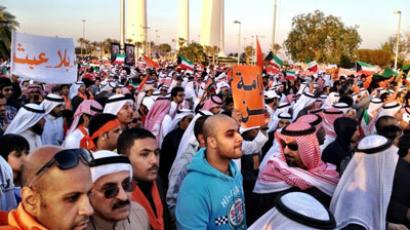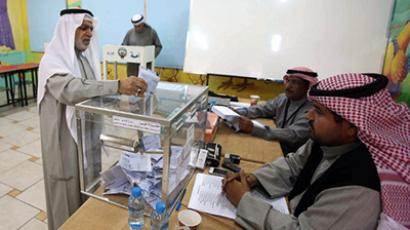Tens of thousands of Kuwaitis demand dissolution of new parliament
Protesters have hit Kuwait City demanding the dissolution of the parliament elected last week and the cancelation of an amendment to election laws. The emir invited the new house to hold its inaugural session, rejecting the opposition’s calls.
Crowds of men, women and children wearing orange, the color of the protest movement, marched along a coastal road on the edge of the capital, heading for Kuwait Towers, a major landmark by the Gulf."This parliament is illegitimate, this [electoral law] amendment is illegal," chanted the protesters.The demonstrators called on the government to abolish the decree, which lowered the number of candidates a voter is eligible to pick from the maximum of four to one. They claim the amendment was adopted so that the government could have even more control over the parliament.Kuwait's government, where members of the ruling family hold top posts, however, says the new rules bring the country in line with democratic norms elsewhere. Last week's snap polls were boycotted by the opposition, and all 50 seats were won by pro-government candidates, including a record 17 seats by the Shiite minority.The opposition's supporters have been demonstrating for the second week in a row, attracting large numbers of people as police watched the protest without interfering.On Saturday, the demonstrators also raised banners reading "No to violence, enough arrests," in reference to violent clashes between police and protesters over the past several days.The confrontations had broken out between riot police and youth activists who staged protests every night since Monday to express their rejection of the election. Police used teargas and stun grenades liberally while battling the activists at that demonstration. More than 150 protesters and 24 police officers were injured while dozens were arrested.
Kuwaiti Emir Sheikh Sabah Al Ahmad Al Sabah on Wednesday reappointed Sheikh Jaber Mubarak Al Sabah as premier, after the cabinet resigned in a routine step required after the election. Kuwait, which is one of the oldest Gulf monarchies, has one of the most open political system among the Gulf Arab states. Parliament has legislative powers and the right to question ministers. But the emir, head of the Al-Sabah family that has ruled Kuwait for 250 years, still appoints the prime minister, who in turn chooses the cabinet.Despite the protest mood showing no signs of dying down, Kuwait's monarchy is not under threat, according to geopolitical analyst Eric Draitser.“The Kuwait monarchy is entirely dependent upon the United States and other powers, which need Kuwait and other countries like it to maintain control of oil dominance in the region. So, if any of those regimes were to fall, it would create severe economic shockwaves for the US and the other powers and, of course, they are not able to execute their geopolitical agenda unless they have hegemony in the Middle East,” Draitser told RT.














